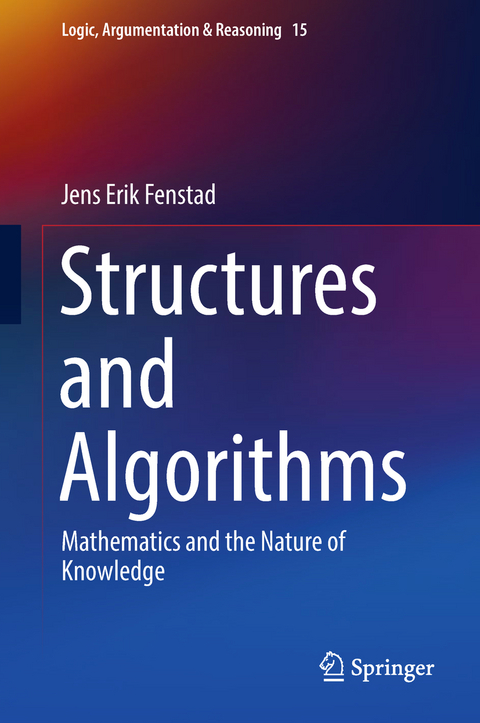
Structures and Algorithms
Springer International Publishing (Verlag)
978-3-319-72973-2 (ISBN)
This book explains exactly what human knowledge is. The key concepts in this book are structures and algorithms, i.e., what the readers "see" and how they make use of what they see. Thus in comparison with some other books on the philosophy (or methodology) of science, which employ a syntactic approach, the author's approach is model theoretic or structural.
Properly understood, it extends the current art and science of mathematical modeling to all fields of knowledge. The link between structure and algorithms is mathematics. But viewing "mathematics" as such a link is not exactly what readers most likely learned in school; thus, the task of this book is to explain what "mathematics" should actually mean.
Chapter 1, an introductory essay, presents a general analysis of structures, algorithms and how they are to be linked. Several examples from the natural and social sciences, and from the history of knowledge, are provided in Chapters 2-6. In turn, Chapters7 and 8 extend the analysis to include language and the mind.Structures are what the readers see. And, as abstract cultural objects, they can almost always be seen in many different ways. But certain structures, such as natural numbers and the basic theory of grammar, seem to have an absolute character. Any theory of knowledge grounded in human culture must explain how this is possible. The author's analysis of this cultural invariance, combining insights from evolutionary theory and neuroscience, is presented in the book's closing chapter.
The book will be of interest to researchers, students and those outside academia who seek a deeper understanding of knowledge in our present-day society.
Jens Erik Fenstad is a Professor Emeritus of Mathematics and former Pro-Rector of the University of Oslo, Norway. He was the Chairman of the Standing Committee for the Physical and Engineering Sciences of the European Science Foundation, a former President of the International Union of History and Philosophy of Science, and past Chair of the UNESCO World Commission on the Ethics of Scientific Knowledge and Technology. He is the author of several books including "General Recursion Theory", "Nonstandard Methods in Stochastic Analysis and Mathematical Physics", and "Grammar, Geometry and Brain".
1.Preface.- 2.Introduction.- 3.Mathematics and the nature of knowledge - an introductory essay.- 4.The miraculous left hand - Leonardo and the nature of knowledge.- 5.Relationships between the social and natural sciences.- 6.Changes in the knowledge system and their implications for the formative stage of scholars.- 7.Remarks on the science and technology of language.- 8.How mathematics is rooted in life.- 9.Tarski, truth and natural languages.- 10.Formal semantics, geometry and mind.- 11.Discours, Interaction and Communication.- 12.On what there is - infinitesimals and the nature of numbers.
"This book collects eight essays ... . there is much to be learnt from this collection for the reader who is prepared to make the effort to interrogate Fenstad's thoughts ... provided him with a deep appreciation of the role of mathematical modeling in the development of scientific knowledge. ... As for who the interested reader might be, I see four potential candidates: well-educated lay people ... philosophers of mathematics and philosophers of science ... ." (Julian C. Cole, Philosophia Mathematica, July 9, 2022)
“This book collects eight essays … . there is much to be learnt from this collection for the reader who is prepared to make the effort to interrogate Fenstad’s thoughts … provided him with a deep appreciation of the role of mathematical modeling in the development of scientific knowledge. … As for who the interested reader might be, I see four potential candidates: well-educated lay people … philosophers of mathematics and philosophers of science … .” (Julian C. Cole, Philosophia Mathematica, July 9, 2022)
| Erscheinungsdatum | 06.04.2018 |
|---|---|
| Reihe/Serie | Logic, Argumentation & Reasoning |
| Zusatzinfo | X, 134 p. 7 illus. |
| Verlagsort | Cham |
| Sprache | englisch |
| Maße | 155 x 235 mm |
| Gewicht | 343 g |
| Themenwelt | Geisteswissenschaften ► Philosophie ► Allgemeines / Lexika |
| Geisteswissenschaften ► Philosophie ► Erkenntnistheorie / Wissenschaftstheorie | |
| Schlagworte | _ • Evolutionary Thinking Neuroscience • Fenstad European Science Foundation • Fenstad General Recursion Theory • Fenstad History and Philosophy of Science • Fenstad World Commission • Grammar Brain • Grammar Brain • Grammar Brain • Knowledge Culture • Knowledge Culture • Knowledge Culture • Knowledge Grammar Culture • Knowledge Nature Culture • Knowledge System Scholars • Modeltheoretic Philosophy • Nature Knowledge • Nature Knowledge • NatureKnowledge • Nature Numbers • Nature Numbers • Nature Numbers • Social Natural Sciences • Structure Culture • Structures Algorithms • Structures Algorithms • Structures Algorithms • Theory of Knowledge • Universal Grammar • Universal Grammar • Universal Grammar |
| ISBN-10 | 3-319-72973-X / 331972973X |
| ISBN-13 | 978-3-319-72973-2 / 9783319729732 |
| Zustand | Neuware |
| Haben Sie eine Frage zum Produkt? |
aus dem Bereich


